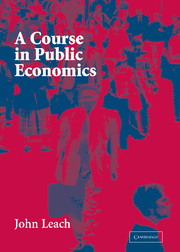Book contents
- Frontmatter
- Contents
- List of Figures
- Preface
- 1 Introduction
- Markets
- Externalities
- Public Goods
- Imperfect Competition
- 14 Monopoly
- 15 Pricing Rules under Imperfect Competition
- Taxation and Efficiency
- Asymmetric Information and Efficiency
- Asymmetric Information and Income Redistribution
- A Note on Maximization
- References
- Index
14 - Monopoly
from Imperfect Competition
Published online by Cambridge University Press: 06 July 2010
- Frontmatter
- Contents
- List of Figures
- Preface
- 1 Introduction
- Markets
- Externalities
- Public Goods
- Imperfect Competition
- 14 Monopoly
- 15 Pricing Rules under Imperfect Competition
- Taxation and Efficiency
- Asymmetric Information and Efficiency
- Asymmetric Information and Income Redistribution
- A Note on Maximization
- References
- Index
Summary
The first theorem's claim that every competitive equilibrium is Pareto optimal hinges upon the assumption that perfect competition prevails in the markets for both consumption goods and factors of production. Economists are much less sanguine about the efficiency of free markets when large firms dominate some of the markets.
A firm's domination of a market is most complete when it is the sole seller or sole buyer in a market, that is, when it is a monopolist or a monopsonist. This chapter examines some of the consequences of monopoly.
NATURAL MONOPOLY
A production process displays increasing returns to scale if output more than doubles when the use of every input is doubled. The cost curves of a firm that produces under increasing returns to scale have two important properties:
Average cost falls as output rises.
Marginal cost is everywhere below average cost.
A market in which production is characterized by increasing returns to scale is said to be a natural monopoly because only one firm can survive in such a market. Initially, a number of competing firms will “race to get big.” The larger firms will have lower average costs than their smaller competitors and will be able to charge lower prices. The smaller firms will be unable to earn profits and will be driven from the market. Ultimately, only one firm will remain in the market.
- Type
- Chapter
- Information
- A Course in Public Economics , pp. 219 - 227Publisher: Cambridge University PressPrint publication year: 2003



